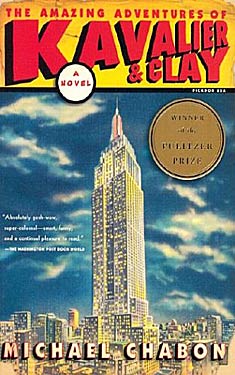
Added By: Administrator
Last Updated: Administrator
The Amazing Adventures of Kavalier & Clay
| Author: | Michael Chabon |
| Publisher: |
Random House, 2000 |
| Series: | |
|
This book does not appear to be part of a series. If this is incorrect, and you know the name of the series to which it belongs, please let us know. |
|
| Book Type: | Novel |
| Genre: | Fantasy |
| Sub-Genre Tags: | Alternate History (Fantasy) Superhero Fantasy Mythic Fiction (Fantasy) |
| Awards: | |
| Lists: | |
| Links: |
|
| Avg Member Rating: |
|
|
|
|
Synopsis
With this brilliant novel, the bestselling author of The Mysteries of Pittsburgh and Wonder Boys gives us an exhilarating triumph of language and invention, a stunning novel in which the tragicomic adventures of a couple of boy geniuses reveal much about what happened to America in the middle of the twentieth century. Like Phillip Roth's American Pastoral or Don DeLillo's Underworld, Michael Chabon's The Amazing Adventures of Kavalier & Clay is a superb novel with epic sweep, spanning continents and eras, a masterwork by one of America's finest writers.
It is New York City in 1939. Joe Kavalier, a young artist who has also been trained in the art of Houdini-esque escape, has just pulled off his greatest feat to date: smuggling himself out of Nazi-occupied Prague. He is looking to make big money, fast, so that he can bring his family to freedom. His cousin, Brooklyn's own Sammy Clay, is looking for a collaborator to create the heroes, stories, and art for the latest novelty to hit the American dreamscape: the comic book. Out of their fantasies, fears, and dreams, Joe and Sammy weave the legend of that unforgettable champion the Escapist. And inspired by the beautiful and elusive Rosa Saks, a woman who will be linked to both men by powerful ties of desire, love, and shame, they create the otherworldly mistress of the night, Luna Moth. As the shadow of Hitler falls across Europe and the world, the Golden Age of comic books has begun.
The brilliant writing that has led critics to compare Michael Chabon to John Cheever and Vladimir Nabokov is everywhere apparent in The Amazing Adventures of Kavalier & Clay. Chabon writes "like a magical spider, effortlessly spinning out elaborate webs of words that ensnare the reader," wrote Michiko Kakutani of The New York Times about Wonder Boys, and here he has created, in Joe Kavalier, a hero for the century.
Excerpt
Part One--The Escape Artist
In later years, holding forth to an interviewer or to an audience of aging fans at a comic book convention, Sam Clay liked to declare, apropos of his and Joe Kavalier's greatest creation, that back when he was a boy, sealed and hog-tied inside the airtight vessel known as Brooklyn, New York, he had been haunted by dreams of Harry Houdini. "To me, Clark Kent in a phone booth and Houdini in a packing crate, they were one and the same thing," he would learnedly expound at WonderCon or Angouleme or to the editor of Comics Journal. "You weren't the same person when you came out as when you went in. Houdini's first magic act, you know, back when he was just getting started. It was called 'Metamorphosis: It was never just a question of escape. It was also a question of transformation." The truth was that, as a kid, Sammy had only a casual interest, at best, in Harry Houdini and his legendary feats; his great heroes were Nikola Tesla, Louis Pasteur, and Jack London. Yet his account of his role-of the role of his own imagination-in the Escapist's birth, like all of his best fabulations, rang true. His dreams had always been Houdiniesque: they were the dreams of a pupa struggling in its blind cocoon, mad for a taste of light and air.
Houdini was a hero to little men, city boys, and Jews; Samuel Louis Klayman was all three. He was seventeen when the adventures began: bigmouthed, perhaps not quite as quick on his feet as he liked to imagine, and tending to be, like many optimists, a little excitable. he was not, in any conventional way, handsome. His face was an inverted triangle, brow large, chin pointed, with pouting lips and a blunt, quarrelsome nose. He slouched, and wore clothes badly: he always looked as though he had just been jumped for his lunch money. He went forward each morning with the hairless cheek of innocence itself, but by noon a clean shave was no more than a memory, a hoboish penumbra on the jaw not quite sufficient to make him look tough. He thought of himself as ugly, but this was because he had never seen his face in repose. He had delivered the Eagle for most of 1931 in order to afford a set of dumbbells, which he had hefted every morning for the next eight years until his arms, chest, and shoulders were ropy and strong; polio had left him with the legs of a delicate boy. He stood, in his socks, five feet five inches tall. Like all of his friends, he considered it a compliment when somebody called him a wiseass. He possessed an incorrect but fervent understanding of the workings of television, atom power, and antigravity, and harbored the ambition-one of a thousand-of ending his days on the warm sunny beaches of the Great Polar Ocean of Venus. An omnivorous reader with a self-improving streak, cozy with Stevenson, London, and Wells, dutiful about Wolfe, Dreiser, and Dos Passos, idolatrous of S. J. Perelman, his self-improvement regime masked the usual guilty appetite. In his case the covert passion-one of them, at any rate-was for those two-bit argosies of blood and wonder, the pulps. He had tracked down and read every biweekly issue of The Shadow going back to 1933, and he was well on his way to amassing complete runs of The Avenger and Doc Savage.
The long run of Kavalier & Clay-and the true history of the Escapists birth-began in 1939, toward the end of October, on the night that Sammy's mother burst into his bedroom, applied the ring and iron knuckles of her left hand to the side of his cranium, and told him to move over and make room in the bed for his cousin from Prague. Sammy sat up, heart pounding in the hinges of his jaw. In the livid light of the fluorescent tube over the kitchen sink, he made out a slender young man of about his own age, slumped like a question mark against the doorframe, a disheveled pile of newspapers pinned under one arm, the other thrown as if in shame across his face. This, Mrs. Klayman said, giving Sammy a helpful shove toward the wall, was Josef Kavalier, her brother Emil's son, who had arrived in Brooklyn tonight on a Greyhound bus, all the way from San Francisco.
"What's the matter with him?" Sammy said. He slid over until his shoulders touched cold plaster. He was careful to take both of the pillows with him. "Is he sick?"
"What do you think?" said his mother, slapping now at the vacated expanse of bedsheet, as if to scatter any offending particles of himself that Sammy might have left behind. She had just come home from her last night on a two-week graveyard rotation at Bellevue, where she worked as a psychiatric nurse. The stale breath of the hospital was on her, but the open throat of her uniform gave off a faint whiff of the lavender water in which she bathed her tiny frame. The natural fragrance of her body was a spicy, angry smell like fresh pencil shavings. "He can barely stand on his own two feet"
Sammy peered over his mother, trying to get a better look at poor Josef Kavalier in his baggy wool suit. He had known, dimly, that he had Czech cousins. But his mother had not said a word about any of them coming to visit, let alone to share Sammy's bed. He wasn't sure just how San Francisco fitted in to the story.
"There you are," his mother said, standing up straight again, apparently satisfied at having driven Sammy onto the easternmost rive inches of the mattress. She turned to Josef Kavalier. "Come here. I want to tell you something." She grabbed hold of his ears as if taking a jug by the handles, and crushed each of his cheeks in turn with her lips. "You made it. All right? You're here."
"All right," said her nephew. He did not sound unconvinced.
She handed him a washcloth and went out. As soon as she left, Sammy reclaimed a few precious inches of mattress while his cousin stood there, rubbing at his mauled cheeks. After a moment, Mrs. Klayman switched off the light in the kitchen, and they were left in darkness. Sammy heard his cousin take a deep breath and slowly let it out The stack of newsprint rattled and then hit the floor with a heavy thud of defeat. His jacket buttons clicked against the back of a chair; his trousers rustled as he stepped out of them; he let fall one shoe, then the other. His wristwatch chimed against the water glass on the nightstand. Then he and a gust of chilly air got in under the covers, bearing with them an odor of cigarette, armpit, damp wool, and something sweet and somehow nostalgic that Sammy presently identified as the smell, on his cousin's breath, of prunes from the leftover ingot of his mother's "special" meatloaf-prunes were only a small part of what made it so very special-which he had seen her wrap like a parcel in a sheet of wax paper and set on a plate in the Frigidaire. So she had known that her nephew would be arriving tonight, had even been expecting him for supper, and had said nothing about it to Sammy.
Josef Kavalier settled back against the mattress, cleared his throat once, tucked his arms under his head, and then, as if he had been unplugged, stopped moving. He neither tossed nor fidgeted nor even so much as flexed a toe. The Big Ben on the nightstand ticked loudly. Josef's breathing thickened and slowed. Sammy was just wondering if anyone could possibly fall asleep with such abandon when his cousin spoke.
"As soon as I can fetch some money, I will find a lodging, and leave the bed," he said. His accent was vaguely German, furrowed with an odd Scots pleat.
"That would be nice," Sammy said. "You speak good English."
"Thank you"
"Where'd you learn it?"
"I prefer not to say."
"It's a secret?"
"It is a personal matter."
"Can you tell me what you were doing in California?" said Sammy. "Or is that confidential information too?"
"I was crossing over from Japan!'
"Japan!" Sammy was sick with envy. He had never gone farther on his soda-straw legs than Buffalo, never undertaken any crossing more treacherous than the flatulent poison-green ribbon that separated Brooklyn from Manhattan Island. In that narrow bed, in that bedroom hardly wider than the bed itself, at the back of an apartment in a solidly lower-middle-class building on Ocean Avenue, with his grandmother's snoring shaking the walls like a passing trolley, Sammy dreamed the usual Brooklyn dreams of flight and transformation and escape. He dreamed with fierce contrivance, transmuting himself into a major American novelist, or a famous smart person, like Clifton Fadiman, or perhaps into a heroic doctor; or developing, through practice and sheer force of will, the mental powers that would give him a preternatural control over the hearts and minds of men. In his desk drawer lay-and had lain for some time-the first eleven pages of a massive autobiographical novel to be entitled either (in the Perelmanian mode)Through Abe Glass, Darkly or (in the Dreiserian) American Disillusionment (a subject of which he was still by and large ignorant). He had devoted an embarrassing number of hours of mute concentration-brow furrowed, breath held-to the development of his brain's latent powers of telepathy and mind control. And he had thrilled to that Iliad of medical heroics, The Microbe Hunters, ten times at least. But like most natives of Brooklyn, Sammy considered himself a realist, and in general his escape plans centered around the attainment of fabulous sums of money.
From the age of six, he had sold seeds, candy bars, houseplants, cleaning fluids, metal polish, magazine subscriptions, unbreakable combs, and shoelaces door-to-door. In a Zharkov's laboratory on the kitchen table, he had invented almost functional button-reattachers, tandem bottle openers, and heatless clothes irons. In more recent years, Sammy's commercial attention had been arrested by the field of professional illustration. The great commercial illustrators and cartoonists Rockwell, Leyendecker, Raymond, Caniff-were at their zenith, and there was a general impression abroad that, at the drawing board, a man could not only make a good living but alter the very texture and tone of the national mood. In Sammy's closet were stacked dozens of pads of coarse newsprint, filled with horses, Indians, football heroes, sentient apes, Fokkers, nymphs, moon rockets, buckaroos, Saracens, tropic jungles, grizzlies, studies of the folds in women's clothing, the dents in men's hats, the lights in human irises, clouds in the western sky. His grasp of perspective was tenuous, his knowledge of human anatomy dubious, his line often sketchy-but he was an enterprising thief. He clipped favorite pages and panels out of newspapers and comic books and pasted them into a fat notebook: a thousand different exemplary poses and styles. He had made extensive use of his bible of clippings in concocting a counterfeit Terry and the Pirates strip called South China Sea, drawn in faithful imitation of the great Caniff. He had knocked off Raymond in something he called Pimpernel of the Planets, and Chester Gould in a lockjawed G-man strip called Knuckle Duster Doyle. He had tried swiping from Hogarth and Lee Falk, from George Herriman, Harold Gray, and Elzie Segar. He kept his sample strips in a fat cardboard portfolio under his bed, waiting for an opportunity, for his main chance, to present itself.
"Japan!" he said again, reeling at the exotic Caniffian perfume that hung over the name. "What were you doing there?"
"Mostly I was suffering from the intestinal complaint," Josef Kavalier said. "and I suffer still. Particular in the night."
Sammy pondered this information for a moment, then moved a little nearer to the wall.
"Tell me, Samuel," Josef Kavalier said. "How many examples must I have in my portfolio?"
"Not Samuel. Sammy. No, call me Sam."
"Sam."
"What portfolio is that?"
"My portfolio of drawings. To show your employer. Sadly, I am obligated to leave behind all of my work in Prague, but I can very quickly do much more that will be frightfully good."
"To show my boss?" Sammy said, sensing in his own confusion the persistent trace of his mother's handiwork. "What are you talking about?"
"Your mother suggested that you might to help me get a job in the company where you work. I am an artist, like you."
"An artist." Again Sammy envied his cousin. This was statement he himself would never have been able to utter without lowering his fraudulent gaze to his show tops. "My mother told you I was an artist?"
"A commercial artist, yes. For the Empire Novelties Incorporated Company."
For an instant Sammy cupped the tiny flame this secondhand compliment lit within him. Then he blew it out.
"She was talking through her hat," he said.
"Sorry?"
"She was full of it."
"Full of...?"
"I'm an inventory clerk. Sometimes they let me do pasteup for an ad. Or when they add a new item to the line, I get to do the illustration. For that, they pay me two dollars per."
"Ah." Josef Kavalier let out another long breath. He still had not moved a muscle. Sammy couldn't decide if this apparent utter motionlessness was the product of unbearable tension or a marvelous calm. "She wrote a letter to my father," Josef tried. "I remember she said you create designs of superb new inventions and devices."
"Guess what?"
"She talked into her hat."
Sammy sighed, as if to suggest that this was unfortunately the case; a regretful sigh, long-suffering---and false. No doubt, his mother writing to her brother in Prague, had believed that she was making an accurate report; it was Sammy who had been talking through his hat for the last year, embroidering, not only for her benefit but to anyone who would listen, the menial nature of his position at Empire Novelties. Sammy was briefly embarassed, not so much at being caught out and having to confess his lowly status to his cousin, as at this evidence of a flaw in the omniveillant maternal loupe. Then he wondered if his mother, far from being hoodwinked by his boasting, had not in fact been counting on his having grossly exaggerated the degree of his influence over Sheldon Anapol, the owner of Empire Novelties. If he were to keep up the pretense to which he had devoted so much wind and invention, then he was all but obliged to come home from work tomorrow night clutching a job for Josef Kavalier in his grubby little stock clerk's fingers.
"I'll try," he said, and it was then that he felt the first spark, the tickling finger of possibility along his spine. For another long while, neither of them spoke. This time, Sammy could feel that Josef was still awake, could almost hear the capillary tricklee of doubt seeping in, weighing the kid down. Sammy felt sorry for himi. "Can I ask you a question?" he said.
"Ask me what?"
"What was with all the newspapers?"
"They are your New York newspapers. I bought them at the Grand Central Station."
"How many?"
For the first time, he noticed, Josef Kavalier twitched. "Eleven."
Sammy quickly calculated on his ringers: there were eight metropolitan dailies. Ten if you counted the Eagle and the Home News. "I'm missing one."
"Missing...?"
"Times, Herald Tribune," he touched two fingertips, "World-Telegram, Journal-American, Sun." He switched hands. "News, Post. Uh, Wall Street Journal. And the Brooklyn Eagle. And the Home News in the Bronx." He dropped his hands to the mattress. "What's eleven?"
"The Woman's Daily Wearing."
"Women's Wear Daily?"
"I didn't know it was like that. For the garments."He laughed at himself, a series of brief, throat-clearing rasps. "I was looking for something about Prague."
"Did you find anything? They must have had something in the Times."
"Something. A little. Nothing about the Jews."
"The Jews," said Sammy, beginning to understand. It wasn't the latest diplomatic maneuverings in London and Berlin, or the most recent bit of brutal posturing by Adolf Hitler, that Josef was hoping to get news of. He was looking for an item detailing the condition of the Kavalier family. "You know Jewish? Yiddish. You know it?"
"No."
"That's too bad. We got four Jewish newspapers in New York. They'd probably have something."
"What about German newspapers?"
"I don't know, but I'd imagine so. We certainly have a lot of Germans. They've been marching and having rallies all over town."
"I see."
"You're worried about your family?"
There was no reply.
"They couldn't get out?"
"No. Not yet" Sammy felt Josef give his head a sharp shake, as if to end the discussion. "I find I have smoked all my cigarettes," he went on, in a neutral, phrase-book tone. "Perhaps you could-"
"You know, I smoked my last one before bed," said Sammy. "Hey, how'd you know I smoke? Do I smell?"
"Sammy," his mother called, "sleep."
Sammy sniffed himself. "Huh. I wonder if Ethel can smell it. She doesn't like it. I want to smoke, I've got to go out the window, there, onto the fire escape."
"No smoking in bed," Josef said. "The more reason then for me to leave it."
"You don't have to tell me," Sammy said. "I'm dying to have a place of my own."
They lay there for a few minutes, longing for cigarettes and for all the things that this longing, in its perfect frustration, seemed to condense and embody.
"Your ash holder," Josef said finally. "Ashtray!'
"On the fire escape. It's a plant!"
"It might be filled with the... spacek?... kippe?... the stubbles?"
"The butts, you mean?"
"The butts."
"Yeah, I guess. Don't tell me you'd smoke-"
Without warning, in a kind of kinetic discharge of activity that seemed to be both the counterpart and the product of the state of perfect indolence that had immediately preceded it, Josef rolled over and out of the bed. Sammy's eyes had by now adjusted to the darkness of his room, which was always, at any rate, incomplete. A selvage of gray-blue radiation from the kitchen tube fringed the bedroom door and mingled with a pale shaft of nocturnal Brooklyn, a compound derived from the haloes of streetlights, the headlamps of trolleys and cars, the fires of the borough's three active steel mills, and the shed luster of the island kingdom to the west, that came slanting in through a parting in the curtains. In this faint glow that was, to Sammy, the sickly steady light of insomnia itself, he could see his cousin going methodically through the pockets of the clothes he had earlier hung so carefully from the back of the chair.
"The lamp?" Josef whispered.
Sammy shook his head. "The mother," he said.
Josef came back to the bed and sat down. "Then we must to work in the darkness."
He held between the first fingers of his left hand a pleated leaf of cigarette paper. Sammy understood. He sat up on one arm, and with the other tugged the curtains apart, slowly so as not to produce the telltale creak. Then, gritting his teeth, he raised the sash of the window beside his bed, letting in a chilly hum of traffic and a murmuring blast of cold March midnight. Sammy's "ashtray" was an oblong terra-cotta pot, vaguely Mexican, filled with a sterile compound of potting soil and soot and the semipetrified skeleton, appropriately enough, of a cineraria that had gone unsold during Sammy's houseplant days and thus predated his smoking habit, still a fairly recent acquisition, by about three years. A dozen stubbed-out ends of Old Golds squirmed around the base of the withered plant, and Sammy distastefully plucked a handful of them-they were slightly damp-as if gathering night crawlers, then handed them in to his cousin, who traded him for a box of matches that evocatively encouraged him to EAT AT JOE'S CRAB ON FISHERMAN'S WHARF, in which only one match remained.
Quickly, but not without a certain showiness, Josef split open seven butts, one-handed, and tipped the resultant mass of pulpy threads into the wrinkled scrap of Zig Zag. After half a minute's work, he had manufactured them a smoke.
"Come," he said. He walked on his knees across the bed to the window, where Sammy joined him, and they wriggled through the sash and thrust their heads and upper bodies out of the building. He handed the cigarette to Sammy and, in the precious flare of the match, as Sammy nervously sheltered it from the wind, he saw that Josef had prestidigitated a perfect cylinder, as thick and straight and nearly as smooth as if rolled by machine. Sammy took a long drag of True Virginia Flavor and then passed the magic cigarette back to its crafter, and they smoked it in silence, until only a hot quarter inch remained. Then they climbed back inside, lowered the sash and the blinds, and lay back, bedmates, reeking of smoke.
"You know," Sammy said, "we're, uh, we've all been really worried... about Hitler... and the way he's treating the Jews and... and all that. When they, when you were... invaded.... My mom was... we all..." He shook his own head, not sure what he was trying to say. "Here." He sat up a little, and tugged one of the pillows out from under the back of his head.
Josef Kavalier lifted his own head from the mattress and stuffed the pillow beneath it. "Thank you," he said, then lay still once more.
Presently, his breathing grew steady and slowed to a congested rattle, leaving Sammy to ponder alone, as he did every night, the usual caterpillar schemes. But in his imaginings, Sammy found that, for the first time in years, he was able to avail himself of the help of a confederate.
Copyright © 2000 by Michael Chabon
Reviews
Images

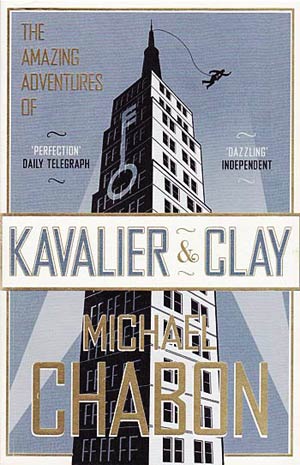


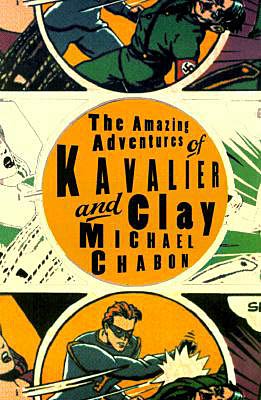


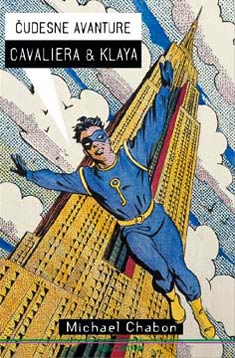

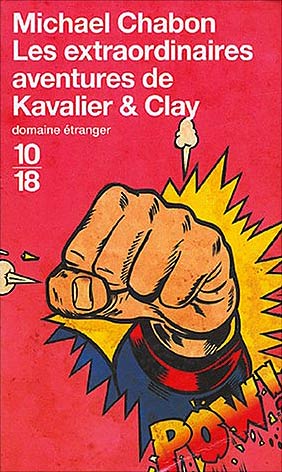
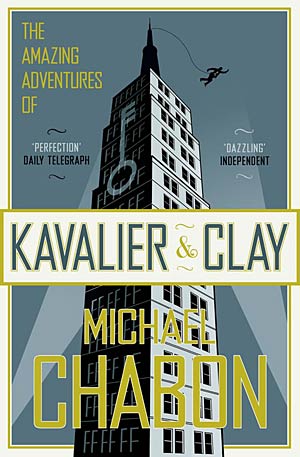
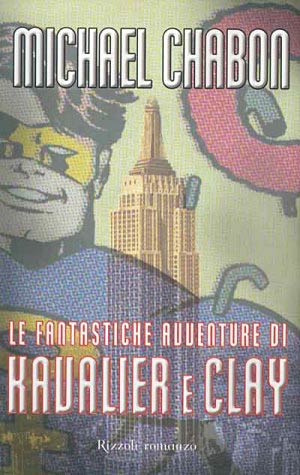

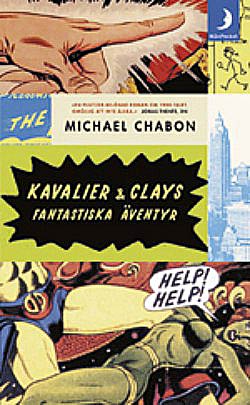




















 Full Details
Full Details





